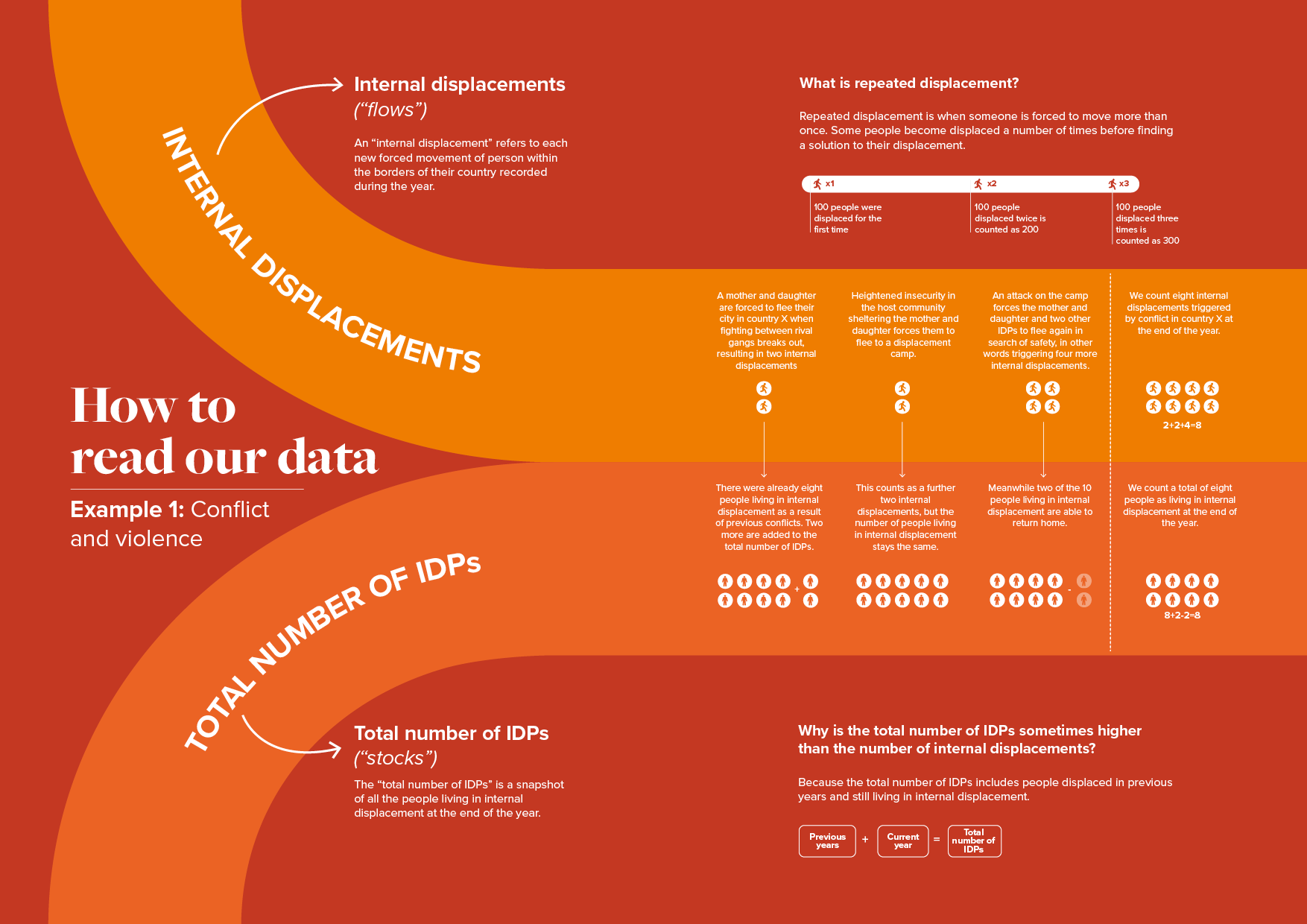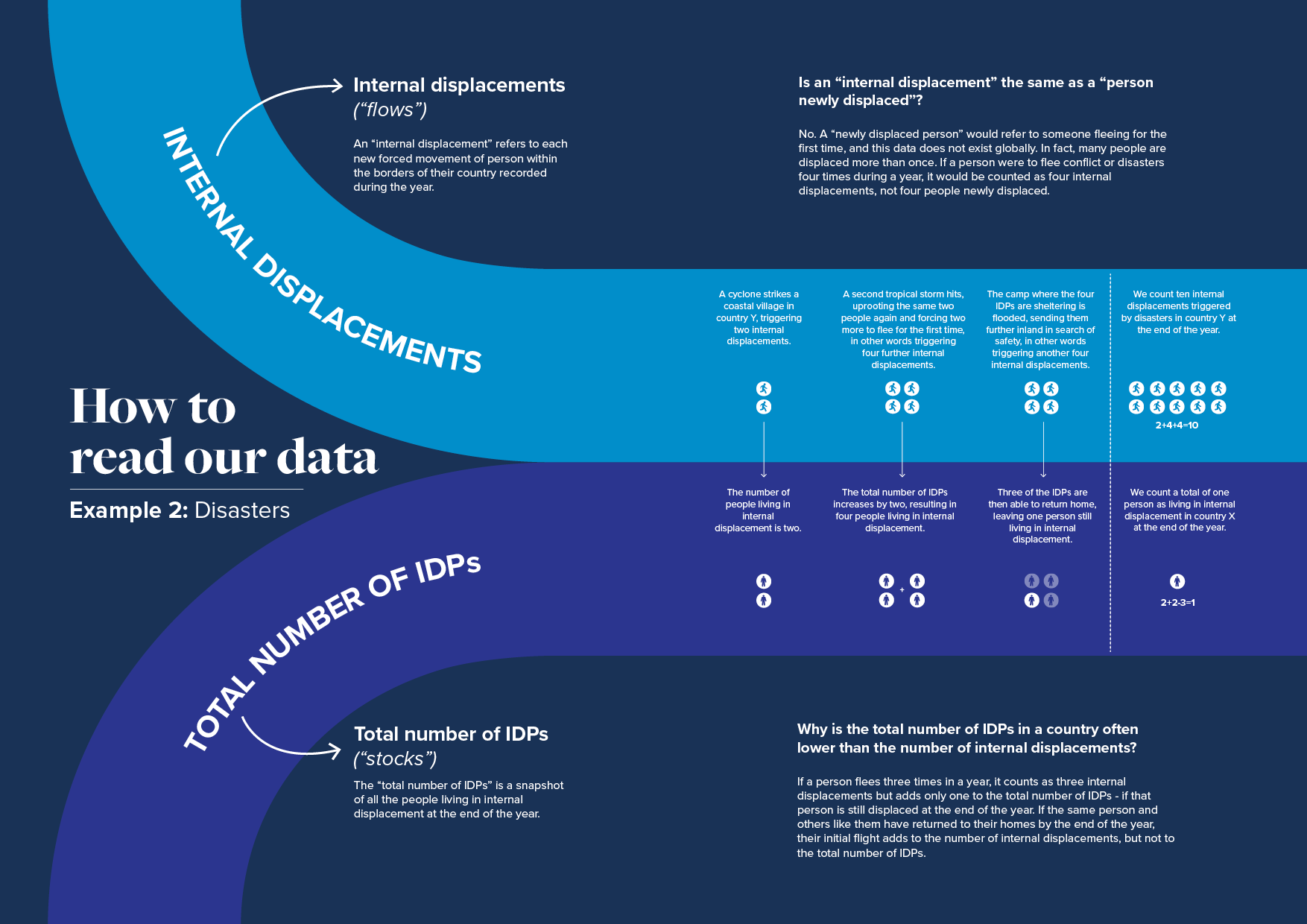At a glance
Internal displacements in 2021


* Due to rounding, some totals may not correspond with the sum of the separate figures.
Total number of IDPs


How to read our data


Part 1: the global picture
Internal displacement in 2021
Conflict, violence and disasters triggered 38 million internal displacements across 141 countries and territories in 2021, the second highest annual figure in a decade after 2020's record-breaking year for disaster displacement. Conflict and violence triggered 14.4 million movements, an increase of almost 50 per cent on the year before.
Top twenty-five countries with most internal displacements
Breakdown by conflict and disaster
People living in displacement
There were 59.1 million internally displaced people across the world at the end of 2021, 53.2 million as a result of conflict and violence, and 5.9 million as a result of disasters.
- Conflict and violence
- Disasters
Regional overviews
Sub-Saharan Africa accounted for more than 80 per cent of all internal displacements triggered by conflict and violence worldwide in 2021. The regional total was 4.7 million higher than the figure for the previous year, driven mostly by conflict in Ethiopia, the Democratic Republic of the Congo (DRC), Burkina Faso, Somalia and the Central African Republic (CAR).
Most of the new and repeated displacements triggered by disasters in 2021 were recorded in the Asia and Pacific regions, which together accounted for about 80 per cent of the total. Tropical cyclones, monsoon rains and floods hit highly exposed areas that are home to millions of people. The most affected countries were China, the Philippines and India.
Sub-Saharan Africa
Conflict and violence triggered 11.6 million internal displacements in sub-Saharan Africa in 2021, the highest figure ever recorded for the region. New waves of violence in eastern Africa and escalating tensions and conflict in the central Sahel and Lake Chad regions accounted for most of the movements, but violence also led to displacement in southern and central Africa, most notably in CAR, DRC and Mozambique. Foreign military activity also influenced displacement and return trends in a number of countries.
Regional Overview - Sub-Saharan Africa →
Spotlight - Ethiopia: Crisis in the north leads to unprecedented displacement →
Spotlight - Sudan: A five-fold increase in internal displacement →
Middle East and North Africa
Conflict and violence triggered one million internal displacements in the Middle East and North Africa (MENA) in 2021, less than half of the 2.1 million recorded the previous year and the lowest figure for the region in a decade. The decrease was mainly the result of de-escalating conflict in Iraq, Libya and Syria. These countries continued to experience instability, however, and violence increased in Yemen. Conflict also reignited in Gaza in May, triggering more than 117,000 displacements, and violence led to small-scale displacements in Lebanon and Israel. Across the region as a whole, the number of people living in displacement at the end of the year as a result of conflict and violence was largely unchanged from 2020 at 12.3 million.
Regional Overview - Middle East and North Africa →
Spotlight - Palestine: Escalation of hostilities aggravates crisis →
East Asia and the Pacific
Disasters triggered 13.7 million internal displacements in East Asia and the Pacific in 2021, the highest figure since 2016 and above the annual average for the last decade of 11.6 million. As in previous years, the region accounted for the majority of disaster displacements recorded worldwide. It is home to most of the world’s population, many of whom live in areas prone to a wide range of hazards including storms, floods, earthquakes and volcanic eruptions.
Regional Overview - East Asia and Pacific →
Spotlight - China: Henan floods →
Spotlight - Myanmar: Disaster displacement, the other side of the crisis →
Spotlight - Papua New Guina: the changing face of violence →
South Asia
Disasters trigger most of the internal displacement that takes place in South Asia each year, and 2021 was no exception. Nearly 5.3 million disaster displacements were recorded during the year, a relatively high figure globally but lower than the region’s decade average of 6.2 million. The decrease was partly the result of a weaker monsoon season.
Regional Overview - South Asia →
Spotlight - Afghanistan: A surge in urban displacement →
The Americas
Disasters were the main trigger of internal displacements in the Americas in 2021, accounting for nearly 1.7 million, more than half of which were the result of storms and floods. The region was also significantly affected by wildfires and geophysical hazards. The availability and accessibility of data vary significantly between countries, which plays a role in the trends discussed below. Smaller-scale disasters tend to go unreported, but they should not be ignored given their impacts on local communities, particularly in Latin America and the Caribbean.
Regional Overview - The Americas →
Spotlight - Haiti: Violence and disasters trigger highest displacement in a decade →
Europe and Central Asia
Disasters triggered 276,000 internal displacements in Europe and Central Asia in 2021. The most significant included wildfires in the Mediterranean, storms and flooding in western and central Europe and a volcanic eruption in Spain’s Canary Islands.
Regional Overview - Europe and Central Asia →
Spotlight - Germany: Floods trigger the highest displacement in years →
Spotlight - Water scarcity, conflict and displacement in Central Asia →
Part 2
Children and youth in internal displacement
Around 25.2 million of the world's IDPs are under the age of 18 and the effects of their displacement go well beyond their immediate safety, wellbeing and education. A healthy and happy child is more likely to contribute to an equitable society and a functioning economy.
More data is needed to better understand these broader and longer-term impacts, but it is clear that protecting and supporting displaced children and young people not only safeguards their rights, but also contributes to a more stable future for all.
Download Part 2: Children and youth in internal displacement →
Conclusion
The number of people living in internal displacement worldwide has reached an all-time high. The unprecedented figures presented in this report are fuelled by both new and protracted conflicts, particularly in Africa and the Middle East. Millions more have fled their homes in Europe in recent months as the war in Ukraine evolves into the largest displacement crisis in the world. Disaster displacement continues to represent a significant global challenge with its impacts being felt in every corner of the world
Behind the data are millions of lives disrupted, communities torn apart, and children deprived of their future. The impacts of displacement not only place a heavy toll on children today, but also on future generations. We must look beyond the direct and immediate consequences on young people to better understand how these are connected to longer-term impacts on communities and societies. In the meantime, recognising children and youth as agents of change is vital to protecting development gains and reducing the risk of future displacement.
In their own words
Jan Egeland, Secretary general, NRC
Christelle Cazabat, IDMC
Farishta Afzaly, Youth advocate
Downloads

Launch of GRID 2022
Launch of GRID 2022: high-level segment
Launch of GRID 2022: technical segment
Launch of GRID 2022: technical segment
Media Pack
Biography of spokespeople







Media Photos / B-Roll





